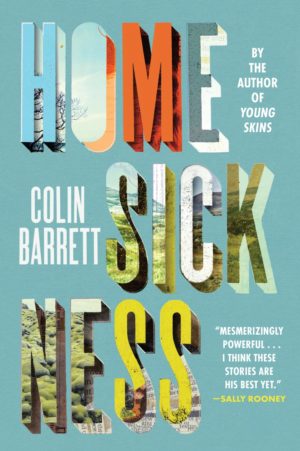Homesickness
by Colin Barrett
reviewed by Jackie Thomas-Kennedy
Colin Barrett opens his magnificent second collection with “A Shooting in Rathreedane,” a story with a blend of violence, empathy, and humor that appears again in “The Alps” and “The Ways,” two other highlights in Homesickness. In the opening story, Sergeant Jackie Noonan answers a call from a man who has shot a thief on his property. When she confers with her colleague, Dennis Crean, Crean takes in the familiar vista.
“They’re very presentable all the same, aren’t they?” he said, nodding at the Ox Mountains.
“They are.”
“That’s the thing about Mayo. I find it’s very presentable from a distance. It’s only up close it lets you down.”
Luckily for his readers, Barrett’s primary concern is “up close,” beyond the hazy beauty that distance imparts. He is a perceptive, curious, and compassionate writer, particularly adept at capturing the fluidity of allegiances among his characters. Jackie Noonan, for instance, recognizes the shooting victim—“he was what you would call ‘known to the police,’” Barrett writes—and proceeds to greet him in a manner that could easily fit in a friendlier context: “God above in Heaven is that you, Dylan Judge?”
Recognizing another person, or running into an old acquaintance, is essential to the structure of many of these stories. Such small-town familiarity establishes common nicknames, reputations, and histories; it offers, too, a somewhat undesirable transparency. (Conversely, when a stranger walks into a pub in “The Alps,” his presence—along with the sword he carries—is cause for increasing alarm.) One story’s title, “Whoever is There, Come on Through,” refers to a local practice of leaving the front door unlocked in an act of welcome; presumably, a complete stranger is unlikely to appear.
Barrett extends the act of recognition beyond the planes of the face and the turns of the country roads. As Noonan questions Judge, who appears to be stealing oil, she recalls her parents reserving the oil in her childhood home, and then the home itself: “She remembered the single-glaze window above her headboard in the bedroom she shared with her sisters Maureen and Patricia, the brown-putty smell of the fly-specked sill and the clear ache in the tips of her fingers when she touched her hand to the thin glass on winter mornings.” Here, Noonan’s empathy grazes Judge, but later, when she lashes out at a teenaged boy who returns her “country salute” with “a pearl of phlegm,” she confronts him with the abrupt violence frequently invoked in this collection: “You know what you did!”
Judge’s surname seems designed to resonate throughout the collection. Later, in “The Low, Shimmering Black Drone,” the narrator, speaking from the throes of the global pandemic, claims that “we were, after all, living in a time when what people wanted from writers was judgement.” In “The Silver Coast,” the quietest, most understated of these works, Lorna attends the funeral of Lydia Healy, an acquaintance she didn’t know well and didn’t especially like. Lorna doesn’t want to finish the ham sandwich she takes at the memorial service, and she grapples with what she imagines to be the dead woman’s judgement: “It felt wrong to just abandon the sandwich. It felt disrespectful, and though she knew no one present would care whether she finished this little bit of food, the thought she could not dispel from her mind was that Lydia Healy would care.” Ultimately, Lorna feeds the remains of her sandwich to gulls on the beach, a decision reached after considerable internal debate. Through his rich depiction of Lorna’s character, Barrett manages to give this small gesture the same startling weight and impact as the dramatic battle in “The Alps.”
The Alps are three brothers. “Fights happened and they got in them,” Barrett writes, with delightful passivity. One of them, Derek, is the sword-bearing stranger and provocateur who falls from his position as a threatening interloper in a pub when his brothers—finding him in his hideout—arrive and assault him brutally. Barrett manages humorous exchanges at the periphery, but the central event is revolting, even frightening. One of the Alps, preparing to bring a badly beaten Derek to the hospital, tells him, “We’re saving your life, is what’s happening.” He adds: “No one is dying on our watch.”
The question of survival also surfaces in “The Ways,” in which three siblings form a new family unit after their parents’ death. Violence, and threats of violence, are ever-present here as well. Gerry, the youngest of the three, favors a video game, Blood Dusk 2, that presents the player with a crucial question on the screen: “DO YOU WISH TO CONTINUE?” Barrett’s meticulous intelligence allows that question to embrace its existential qualities without feeling heavy-handed. The question lingers, hovering over the collection as a whole, and finds at least one of its answers in the first story, when Jackie Noonan’s colleague, Officer Swift, makes this melancholic note on his adaptability: “Wherever I am, that’s where I like.”
Published on September 29, 2022

